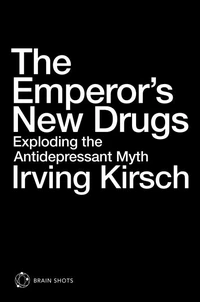Everyone knows that antidepressant drugs are miracles of modern medicine. Professor Irving Kirsch knew this as well as anyone. But, as he discovered during his research, there is a problem with what everyone knows about antidepressant drugs. It isn't true. How did antidepressant drugs gain their reputation as a magic bullet for depression? And why has it taken so long for the story to become public? Answering these questions takes us to the point where the lines between clinical research and marketing disappear altogether.
Using the Freedom of Information Act, Kirsch accessed clinical trials that were withheld, by drug companies, from the public and from the doctors who prescribe antidepressants. What he found, and what he documents here, promises to bring revolutionary change to the way our society perceives, and consumes, antidepressants. The Emperor's New Drugs exposes what we have failed to see before: depression is not caused by a chemical imbalance in the brain; antidepressants are significantly more dangerous than other forms of treatment and are only marginally more effective than placebos; and, there are other ways to combat depression, treatments that don't only include the empty promise of the antidepressant prescription.
This is not a book about alternative medicine and its outlandish claims. This is a book about fantasy and wishful thinking in the heart of clinical medicine, about the seductions of myth, and the final stubbornness of facts.
Everyone knows that antidepressant drugs are miracles of modern medicine. Professor Irving Kirsch knew this as well as anyone. But, as he discovered during his research, there is a problem with what everyone knows about antidepressant drugs. It isn't true. How did antidepressant drugs gain their reputation as a magic bullet for depression? And why has it taken so long for the story to become public? Answering these questions takes us to the point where the lines between clinical research and marketing disappear altogether.
Using the Freedom of Information Act, Kirsch accessed clinical trials that were withheld, by drug companies, from the public and from the doctors who prescribe antidepressants. What he found, and what he documents here, promises to bring revolutionary change to the way our society perceives, and consumes, antidepressants. The Emperor's New Drugs exposes what we have failed to see before: depression is not caused by a chemical imbalance in the brain; antidepressants are significantly more dangerous than other forms of treatment and are only marginally more effective than placebos; and, there are other ways to combat depression, treatments that don't only include the empty promise of the antidepressant prescription.
This is not a book about alternative medicine and its outlandish claims. This is a book about fantasy and wishful thinking in the heart of clinical medicine, about the seductions of myth, and the final stubbornness of facts.

 , qui est-ce ?
, qui est-ce ?